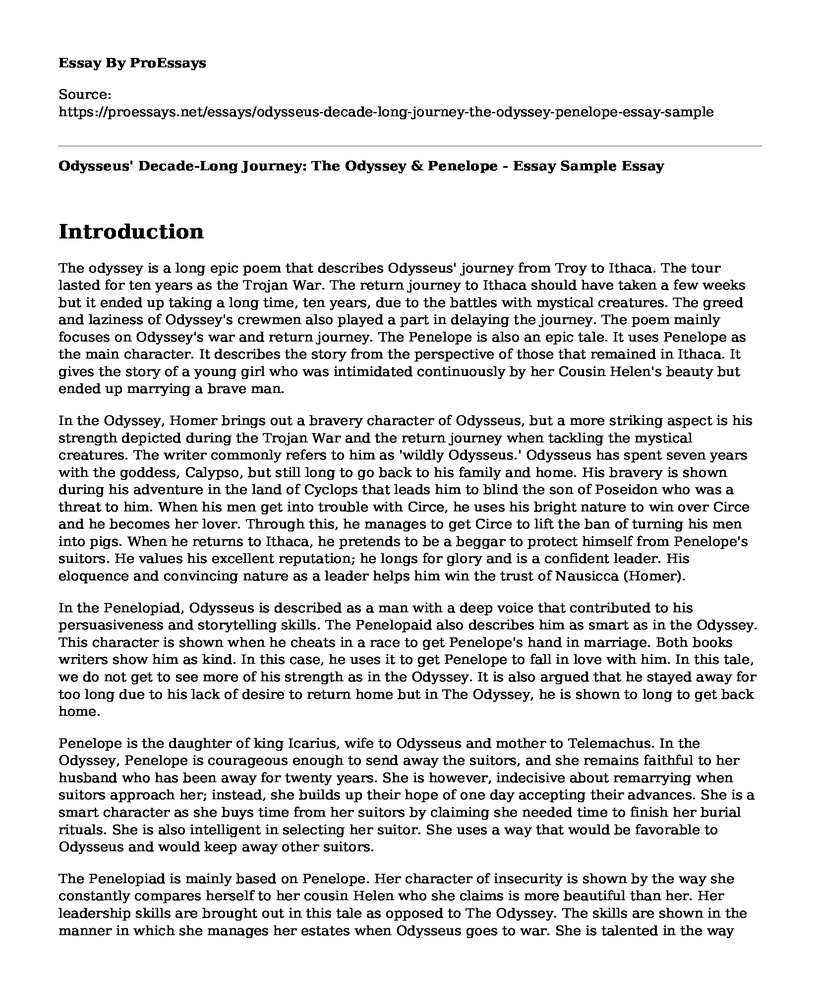Introduction
The odyssey is a long epic poem that describes Odysseus' journey from Troy to Ithaca. The tour lasted for ten years as the Trojan War. The return journey to Ithaca should have taken a few weeks but it ended up taking a long time, ten years, due to the battles with mystical creatures. The greed and laziness of Odyssey's crewmen also played a part in delaying the journey. The poem mainly focuses on Odyssey's war and return journey. The Penelope is also an epic tale. It uses Penelope as the main character. It describes the story from the perspective of those that remained in Ithaca. It gives the story of a young girl who was intimidated continuously by her Cousin Helen's beauty but ended up marrying a brave man.
In the Odyssey, Homer brings out a bravery character of Odysseus, but a more striking aspect is his strength depicted during the Trojan War and the return journey when tackling the mystical creatures. The writer commonly refers to him as 'wildly Odysseus.' Odysseus has spent seven years with the goddess, Calypso, but still long to go back to his family and home. His bravery is shown during his adventure in the land of Cyclops that leads him to blind the son of Poseidon who was a threat to him. When his men get into trouble with Circe, he uses his bright nature to win over Circe and he becomes her lover. Through this, he manages to get Circe to lift the ban of turning his men into pigs. When he returns to Ithaca, he pretends to be a beggar to protect himself from Penelope's suitors. He values his excellent reputation; he longs for glory and is a confident leader. His eloquence and convincing nature as a leader helps him win the trust of Nausicca (Homer).
In the Penelopiad, Odysseus is described as a man with a deep voice that contributed to his persuasiveness and storytelling skills. The Penelopaid also describes him as smart as in the Odyssey. This character is shown when he cheats in a race to get Penelope's hand in marriage. Both books writers show him as kind. In this case, he uses it to get Penelope to fall in love with him. In this tale, we do not get to see more of his strength as in the Odyssey. It is also argued that he stayed away for too long due to his lack of desire to return home but in The Odyssey, he is shown to long to get back home.
Penelope is the daughter of king Icarius, wife to Odysseus and mother to Telemachus. In the Odyssey, Penelope is courageous enough to send away the suitors, and she remains faithful to her husband who has been away for twenty years. She is however, indecisive about remarrying when suitors approach her; instead, she builds up their hope of one day accepting their advances. She is a smart character as she buys time from her suitors by claiming she needed time to finish her burial rituals. She is also intelligent in selecting her suitor. She uses a way that would be favorable to Odysseus and would keep away other suitors.
The Penelopiad is mainly based on Penelope. Her character of insecurity is shown by the way she constantly compares herself to her cousin Helen who she claims is more beautiful than her. Her leadership skills are brought out in this tale as opposed to The Odyssey. The skills are shown in the manner in which she manages her estates when Odysseus goes to war. She is talented in the way she handles her suitors. She uses her maids to spy on the suitors by asking the maids to tell them to tell them bad things about herself and her husband. She delays the suitors by claiming that she would remarry only after fulfilling her obligation to her father in law of making a shroud (Atwood).
Odysseus returned to Ithaca, and with the help of his son, Telemachus, they hanged the maids. He was justified in his action as the maids proved to be disloyal during the period he was away from Ithaca. It was through one of the maids that the suitors learned about Penelope's plan to buy time from the suitors. This revelation put his wife and son in danger. The continued delay would have caused a civil war in which his son and wife would have been the first victims. The hanging was an act of revenge.
References
Atwood, Margaret. The Penelopiad. Faber& Faber, 2014. Document.
Homer. The Odyssey. OUP Oxford, 201. Document.
Cite this page
Odysseus' Decade-Long Journey: The Odyssey & Penelope - Essay Sample. (2023, Mar 16). Retrieved from https://proessays.net/essays/odysseus-decade-long-journey-the-odyssey-penelope-essay-sample
If you are the original author of this essay and no longer wish to have it published on the ProEssays website, please click below to request its removal:
- How Northup and Rowlandson Experienced Captivity
- Critical Essay on "Hills Like White Elephants" by Ernest Hemingway
- The Significance of Delusion, Dreams, and Deception in Death of a Salesman
- Why Is Montresor an Effective Villain: The Cask of Amontillado Essay
- The Odyssey Book XI Close Reading and Critical Analysis
- Essay on The Lottery: A Fateful Annual Tradition in a Small Town
- Article Analysis Essay on a Critic of Mary Shelley's Frankenstein







